

ECCO Position Paper: Harmonization of the Approach to Ulcerative Colitis Histopathology. We use cookies to enhance your experience on our website.
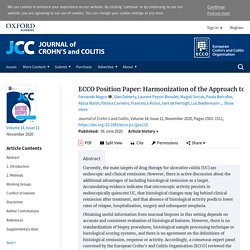
By clicking 'continue' or by continuing to use our website, you are agreeing to our use of cookies. You can change your cookie settings at any time. Skip to Main Content Advertisement Search Close Advanced Search Search Menu Skip Nav Destination Article Navigation Volume 14 Issue 11 November 2020 Article Contents Next > ECCO Position Paper: Harmonization of the Approach to Ulcerative Colitis Histopathology Fernando Magro, Fernando Magro Department of Gastroenterology, Centro Hospitalar Universitário São João , Porto, Portugal.
The Use of Curcumin as a Complementary Therapy in Ulcerative Colitis: A Systematic Review of Randomized Controlled Clinical Trials. 1.
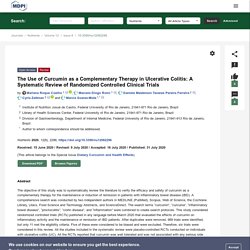
Introduction Inflammatory bowel disease (IBD) is a chronic condition that affects the relapsing gastrointestinal tract, with periods of exacerbation and remission [1,2]. Its main forms of presentation are ulcerative colitis (UC) and Crohn’s disease (CD). Its etiopathogenesis is believed to be due to a loss of tolerance to the intestinal microbiota associated with marked immune responses and environmental factors in genetically susceptible individuals [3]. The conventional approach to IBD aims to induce and maintain clinical remission free of corticosteroids, thus minimizing the impact on quality of life [4].
Identifying safe and effective therapeutic agents for complementary therapies remains an unmet need for these patients. Curcumin is the main pharmacologically active curcuminoid pigment in turmeric. 4. Most of the studies did not describe the purity of the curcumin used. Diet in the Pathogenesis and Management of Ulcerative Colitis; A Review of Randomized Controlled Dietary Interventions. 1.
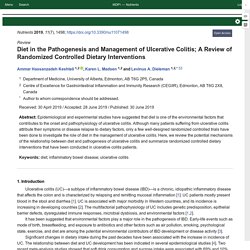
Introduction Ulcerative colitis (UC)—a subtype of inflammatory bowel disease (IBD)—is a chronic, idiopathic inflammatory disease that affects the colon and is characterized by relapsing and remitting mucosal inflammation [1]. UC patients mostly present blood in the stool and diarrhea [1]. UC is associated with major morbidity in Western countries, and its incidence is increasing in developing countries [2]. The multifactorial pathophysiology of UC includes genetic predisposition, epithelial barrier defects, dysregulated immune responses, microbial dysbiosis, and environmental factors [1,2]. Ulcerative Colitis - Mayo Clinic Proceedings. Ulcerative colitis: management. This guideline covers the management of ulcerative colitis in children, young people and adults.
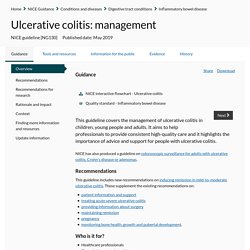
It aims to help professionals to provide consistent high-quality care and it highlights the importance of advice and support for people with ulcerative colitis. This guideline updates and replaces NICE guideline CG166 (June 2013). Your responsibility The recommendations in this guideline represent the view of NICE, arrived at after careful consideration of the evidence available. When exercising their judgement, professionals and practitioners are expected to take this guideline fully into account, alongside the individual needs, preferences and values of their patients or the people using their service. AGA Clinical Practice Guidelines on the Management of Mild-to-Moderate Ulcerative Colitis - Gastroenterology. Patients with UC may have variable anatomic extent of their disease.
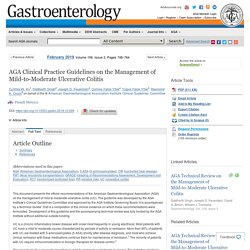
Conventionally, patients are defined as having extensive disease if inflammation extends proximal to the splenic flexure, left-sided disease if inflammation extends proximal to the rectum but not past the splenic flexure (or <50 cm from the anus), and proctitis if inflammation is limited to the rectum (or <15–20 cm from the anus). Both disease severity and anatomic extent are important in choosing appropriate treatment. This guideline addresses the medical management of patients with mild–moderate UC, focusing on use of both oral and topical 5-ASA medications, rectal corticosteroids, and oral budesonide. Unless otherwise specified, we do not present separate recommendations for induction and maintenance of remission, as patients who receive induction therapy with 5-ASAs most commonly remain on these agents to maintain remission. Recommendation 1. ACG Clinical Guideline: Ulcerative Colitis in Adults : American Journal of Gastroenterology.
Ulcerative colitis (UC) is an idiopathic inflammatory disorder.
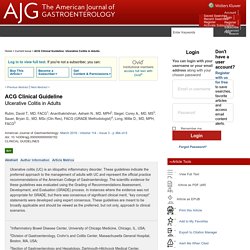
These guidelines indicate the preferred approach to the management of adults with UC and represent the official practice recommendations of the American College of Gastroenterology. The scientific evidence for these guidelines was evaluated using the Grading of Recommendations Assessment, Development, and Evaluation (GRADE) process. Part 2: Consensus on Diagnosis and Management of Ulcerative Colitis. Current Management.
Part 1: Consensus on Diagnosis and Management of Ulcerative Colitis: Definitions, Diagnosis, Extra-intestinal Manifestations, Pregnancy, Cancer Surveillance, Surgery, and Ileo-anal Pouch Disorders.